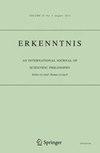动物意识测试就是机器意识测试
IF 0.8
2区 哲学
0 PHILOSOPHY
引用次数: 0
摘要
如果机器有了意识,我们该如何发现呢?在本文中,我对机器意识的阳性测试提出了三个相关的主张。所有这三种说法都围绕着AI可以“特别”构建的理念,也就是说,它可以在明显没有意识的情况下满足特定的意识测试。首先,提议的机器意识测试可以是合法的,即使人工智能可以特别构建来通过这个测试。观察结果强调了这一点,即许多(如果不是全部的话)假定的机器意识测试可以由无意识的机器通过特殊手段通过。其次,我们可以通过从科学哲学中的特设假设概念中获得灵感来识别特设人工智能。第三,考虑到第一种和第二种说法,对动物意识的最可靠的测试结果也是对机器意识的有效和有用的积极测试。如果一个非特定的人工智能表现出由人类意识促进的认知能力集群,可以通过掩蔽选择性地关闭,如果它在适当设计的双重分离任务中再现人类行为,我们应该将人工智能视为有意识的。本文章由计算机程序翻译,如有差异,请以英文原文为准。
Tests of Animal Consciousness are Tests of Machine Consciousness
Abstract If a machine attains consciousness, how could we find out? In this paper, I make three related claims regarding positive tests of machine consciousness. All three claims center on the idea that an AI can be constructed “ad hoc”, that is, with the purpose of satisfying a particular test of consciousness while clearly not being conscious. First, a proposed test of machine consciousness can be legitimate, even if AI can be constructed ad hoc specifically to pass this test. This is underscored by the observation that many, if not all, putative tests of machine consciousness can be passed by non-conscious machines via ad hoc means. Second, we can identify ad hoc AI by taking inspiration from the notion of an ad hoc hypothesis in philosophy of science. Third, given the first and the second claim, the most reliable tests of animal consciousness turn out to be valid and useful positive tests of machine consciousness as well. If a non-ad hoc AI exhibits clusters of cognitive capacities facilitated by consciousness in humans which can be selectively switched off by masking and if it reproduces human behavior in suitably designed double dissociation tasks, we should treat the AI as conscious.
求助全文
通过发布文献求助,成功后即可免费获取论文全文。
去求助
来源期刊

ERKENNTNIS
PHILOSOPHY-
CiteScore
2.10
自引率
11.10%
发文量
116
期刊介绍:
Erkenntnis is a philosophical journal publishing papers committed in one way or another to the philosophical attitude which is signified by the label ''scientific philosophy''. It concentrates on those philosophical fields which are particularly inspired by this attitude, although other topics are welcome as well. These fields are:- Epistemology - Philosophy of science, foundations and methodology of science in general and of natural and human sciences such as physics, biology, psychology, economics, social sciences in particular - Philosophy of mathematics - Logic, philosophy of logic, and all kinds of philosophical logics - Philosophy of language - Ontology, metaphysics, theory of modality - Philosophical psychology, philosophy of mind, neurophilosophy - Practical philosophy, i.e. ethics, philosophy of action, philosophy of law, etc. One of the objectives of Erkenntnis is the provision of a suitable platform for the discussion of controversial issues; another is the provision of timely, competent reviews of important publications in an ever-growing field of research.In recent years, philosophers standing quite outside the pale of analytic philosophy have also paid careful, and indeed most welcome, attention to precision of concept and language, to arguments, and to well-grounded foundations. Erkenntnis provides for them, and for philosophers of all persuasions, a place of meeting, of discussion, and of disputation.Erkenntnis was originally founded in 1930 by Rudolf Carnap and Hans Reichenbach, it was revived in 1975 by Carl G. Hempel, Wolfang Stegmüller, and Wilhelm K. Essler. You can find more information about this in the article “Hempel: The old and the new ‘Erkenntnis’” accessible in the tabs to the right.Today, Erkenntnis is one of the leading journals in philosophy worldwide and attracts first-class authors at all stages of career; from young philosophers at the PhD level up to established academic philosophers and highly renowned senior scholars. We pride ourselves on supplying our authors with substantial referee reports, subject to a turnaround time of about three months until the first decision. The acceptance rate for publications in the journal is presently slightly below 10%.
 求助内容:
求助内容: 应助结果提醒方式:
应助结果提醒方式:


